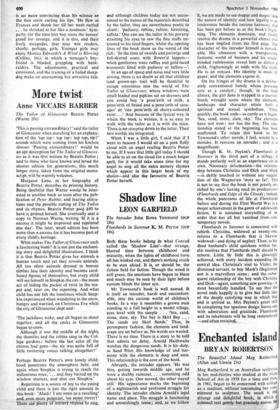Shadow line
LEON GARFIELD
The Intruder John Rowe Townsend (our, 18s) Flambards In Summer K. M. Peyton (MP 18s)
Both these books belong In what Conrad called the 'Shadow Line'—that strange, blurred time between childhood and maturity, when the lights of childhood have all but winked out, and there's nothing much to be seen ahead. It is, or should be, the richest field for fiction. Though the wood is still green, the emotions have begun to blaze and much may be seen by their light before custom blinds the inner eye.
Mr Townsend's book is well named. It is itself an intruder, harsh and uncomfort- able, into the curious world of children's books. In a way it resembles a grown man standing to a full height in a model village, eyes level with the steeple . . . 'Sea, sand, stone, slate, sky. The bay is Skirl Bay . . . The sands are Skirl Sands.' Thus, in peremptory fashion, the elements and land- scape are set before us. No words are wasted. There is no time. There is a story to be told that admits no delay. Arnold Haithwaite watches the dangerous sands. It is his duty, as Sand Pilot. His knowledge of and har- mony with the elements is deep and sure. This relationship is the core of the book.
Abruptly, the intruder appears. 'He was thin, getting towards middle age, and he wore a shabby raincoat. . . . something odd about his eyes. One moved, the other stayed still.' His appearance marks the beginning of a nightmarish and profound struggle for identity. The intruder claims Arnold's legal name and place. The struggle is fascinating and astonishingly tense ; and, as we follow
it, we are made to see deeper and deeper into the nature of identity and how legality is an irrelevance beside the curious harmony that has been put before us at the book's begin- ning. The elements dominate, and finally resolve the drama in a powerful climax that has been implied from the first page. The character of the intruder himself is remark- able. His obsession with a transparently fantastic world of business and his single. minded ruthlessness reveal him as almost a child, frighteningly at odds with life itself. He is an outcast. His identity is made of paper, and the elements expose it.
On the fringes of the drama is a deliber- ately conventional family whose presence acts as a catalyst ; though, in the final climax, the girl Jane is trapped in a marvel- lously wrought scene where the elements, landscape and character attain both a spiritual and sexual symbolism. Then, quickly, the book ends—as curtly as it began. Sea, sand, stone, slate, sky.' The elements have not won ; nor has the boy. The rela- tionship stated at the beginning has been reaffirmed. To relate this book to Mr Townsend's other novels, I feel, would be a mistake. It remains an intruder ; and it is magnificent.
Though K. M. Peyton's Flambards in Summer is the third part of a trilogy, it stands perfectly well as an experience on its own. Necessary information—the relation- ship between Christina and Dick and Mark --is deftly touched in without any sugges- tion of the Wagnerian 'story so far'. This is not to say that the book is not greatly en- riched by one's having read its predecessors (Flambards and Edge of the Cloud); indeed, the whole panorama of life at Flambards before and during the First World War is a major achievement in the genre of adolescent fiction. It is sustained storytelling of an order that has all but vanished from con- temporary novels.
Flambards in Summer is concerned with rebirth. Christina, widowed at twenty-one, returns to a Flambards that is likewise widowed—and dying of neglect. Then, as her dead husband's child quickens within her, she resolves that Flambards itself should be reborn. Little by little this is glowingly achieved, with every incident extending the central idea. Christina's visit to Violet, the dismissed servant, to buy Mark's illegitimate son is a marvellous scene ; and the subse- quent relationship of the boy with Christina and Dick—again, something new growing—Is most beautifully handled. To say that the novel ends happily is to give but little idea of the deeply satisfying way in which that end is arrived at. Mrs Peyton's great skill in completing her spacious design leaves one with admiration and gratitude. Flambards and its inhabitants will be long remembered —and often revisited.














































 Previous page
Previous page